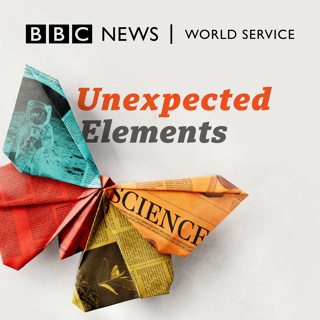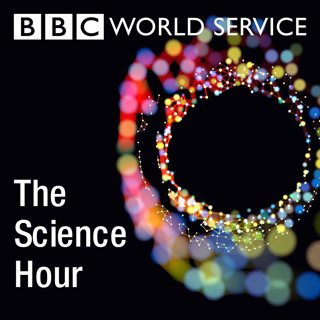
Seismic swift
At a recent Taylor Swift concert in Scotland, seismographs measured a “Swift Quake” caused by foot-stomping fans. But this wasn’t the only star that has made the ground shake - there have been several others, including Travis Scott and Bruce Springsteen. Could this power be harnessed in some way?Turning our attention to non-popstar quakes, there are some animals that seem to predict earthquakes. A pond in Italy, usually filled with toads during breeding season, was suddenly void of them shortly before an earthquake hit. Are there any other animals with seismographic abilities? And is there a chance we could harness their abilities somehow?Also, tremors on the small island of Mayotte led to a surprising deep-sea discovery. Nathalie Feuillet shares some earth-shattering facts about her team’s discovery.And, to shake things up, Marnie and panel talk about the 'Frenchness' of French fries, the tech hidden inside the Euros’ footballs, and the gadgets that fools your employer into thinking you are working.Presenter: Marnie Chesterton, Godfred Boafo, Christine Yohannes Producer: Florian Bohr, Julia Ravey, Dan Welsh, Noa Dowling. Sound engineer: Emily Preston
21 Juni 202449min

An unexpected burger
Could a scientific burger compete against the fast food giants? We fear not!You will need: • Meat - A tick capable of inducing alpha gal syndrome, a disease that makes you allergic to red meat. • Garnish - Lettuce grown in space. (WARNING: it is more susceptible to bacterial infection than that grown on Earth). • Buns - A short but thick guide to the human buttocks with Heather Radke. Why do we humans have such large behinds? • Something sweet - We chose the humble baobab seed. An unusual tree indigenous to Madagascar, the subject of an incredibly successful conservation project. • Fries - Of course! The humble potato is threatened by climate change, what is being done to futureproof it?Instructions: • Who are we kidding! There is no scientific method! • Bang it all together and feast your ears on this week’s show!Presenter: Marnie Chesterton Panellists: Candice Bailey and Affelia Wibisono Producers: Harrison Lewis, Julia Ravey, Ben Motley and Noa Dowling
14 Juni 202449min

Balloon manoeuvres
After North Korean balloons delivered trash to South Korea, we explore balloons of all kinds, why they can be useful, and when they’re not.Scientists have been using balloons for a long time, from pig bladders dropped from great heights, to Michael Faraday inventing the rubber balloon. Floating through the air seems like a great, energy-efficient way to fly. So why isn’t the sky full of airships? And party balloons are fun… but do we want to waste our precious helium on parties? What is this limited gas worth saving for?Also, why you’re likely smarter than your grandparents were at your age, why snails climb up walls, and scientists looking at clouds from space. Presenter: MarnieChesterton Panellists: Andrada Fiscutean, Meral Jamal Guests: Prof Andrea Sella (University College London) and Prof Dave Hodgson (University of Exeter) Producer: Florian Bohr with Harrison Lewis, Julia Ravey and Noa Dowling
7 Juni 202449min

Eternal flames
As the Olympic torch makes its way through France, we investigate the fires that continually smoulder and those which are stomped out. You might expect snow to make a solid fire extinguisher, but in Canada, it is somehow keeping embers alight. These ‘Zombie fires’ keep burning through the winter, releasing huge amounts of carbon into the air and enhancing the tinderbox for summer wildfires. While wildfires leave trails of destruction, for some plants and animals, they act as a catalyst for life – helping them to spread their seeds or flower. And the extent of these blazes can also be marshalled by nature – with elephants and beavers building natural fire breaks into landscapes to prevent uncontrollable flames. We hear about when the first fires happened on Earth and how we can study ancient fires which have long since gone out. Plus, we unpick the key to monogamy (in mice), why cicadas love prime numbers as well as your thoughts on snakes... Presenter: Caroline Steel with Philistiah Mwatee and Chhavi Sachdev Producer: Alex Mansfield with Florian Bohr, Harrison Lewis, Julia Ravey and Noa Dowling Sound engineer: Emily Preston
31 Maj 202449min

A world going on underground
How would you feel if you spent more and more of your life underground? Could that be how more and more of us live in the future? Presenter Marnie Chesterton and panellists Candice Bailey in Johannesburg, South Africa and Tristan Ahtone in Helsinki, Finland dig into subterranean science. Did you know around a million people live underground in China's capital Beijing? Have you heard of the race to dig the deepest hole in the Earth? In this episode we explore how humans have been digging deep for over 3,000 years explorer Christian Clot tell us why living underground with no contact to the world above was a nicer experience that you might expect.
24 Maj 202449min

Winning Losers
In a competitive world, is it always best to finish first? A tribute to second place, second thoughts, and second opinions.You might assume that Olympic gold medallists have more successful lives than their silver-placed competitors. A study shows that on average winners die a year younger than the runners up, and earn less money.In the invasive jelly-fish wars of the Black Sea of recent years, it seems the second-comers prevailed over the voracious first-timers. And what about siblings? Does the first-born in a family really have any discernible advantage in life?Also, the potential perils of cutting-edge wearable medi-tech, the value of second opinions, and the chemical benefits of silver itself.Presented by Marnie Chesterton, with Godfred Boafo and Andrada Fiscutean Produced by Alex Mansfield, with Dan Welsh, Julia Ravey and Noa Dowling Sound by Gwynfor Jones
17 Maj 202449min

Unexpected birthday party
It’s time for an unexpected celebration and we look to science for advice on clothes, cake and how presenter Marnie and panellists Christine and Candice can improve their singing. We also hear about the sleuths who have tracked down an animal that’s been presumed extinct for almost a century, we help a listener find the answer to whether using sunscreen is stopping him from getting vitamin d and Marnie talks to the Dog Aging Project to ask why studying healthy ageing in our canine companions can lead to better health for people too. Presenter: Marnie Chesterton Panellists: Christine Yohannes and Candice Bailey Guests: Bryan Nichols, Pennsylvania State University and Matt Kaberline, founder of the Dog Aging Project. Producer: Tom Bonnett with Dan Welsh, Emily Knight, Julia Ravey and Noa Dowling
10 Maj 202449min

Horsey driverless cars and competitive cloning
The sight of horses running wild in a city leads panellist Tristan Ahtone in Helsinki to rethink how we rate horses' welfare, Chhavi Sachdev in Mumbai tells the story of the country that is cloning the Lionel Messi of horses for sport and presenter Marnie Chesterton finds out why roboticist Eakta Jain is studying horses to engineer better relationships between humans and autonomous vehicles. All that, plus the slippery record for the world's biggest snake, how the alphabet came to be and asteroid forcing scientists to reiterate 'it will not hit Earth'.
3 Maj 202449min





















